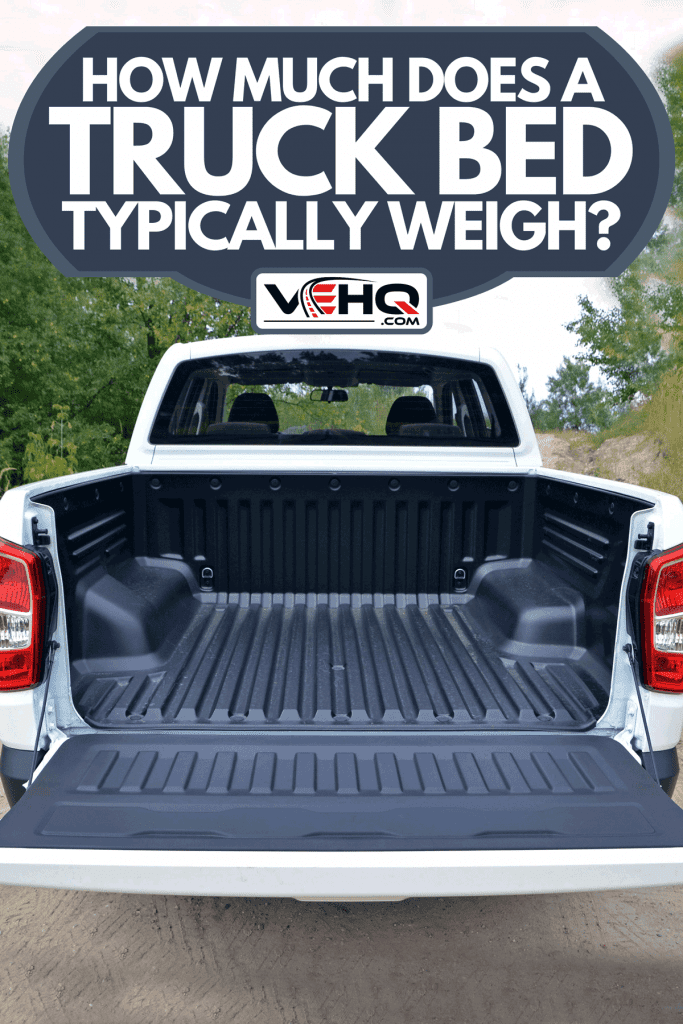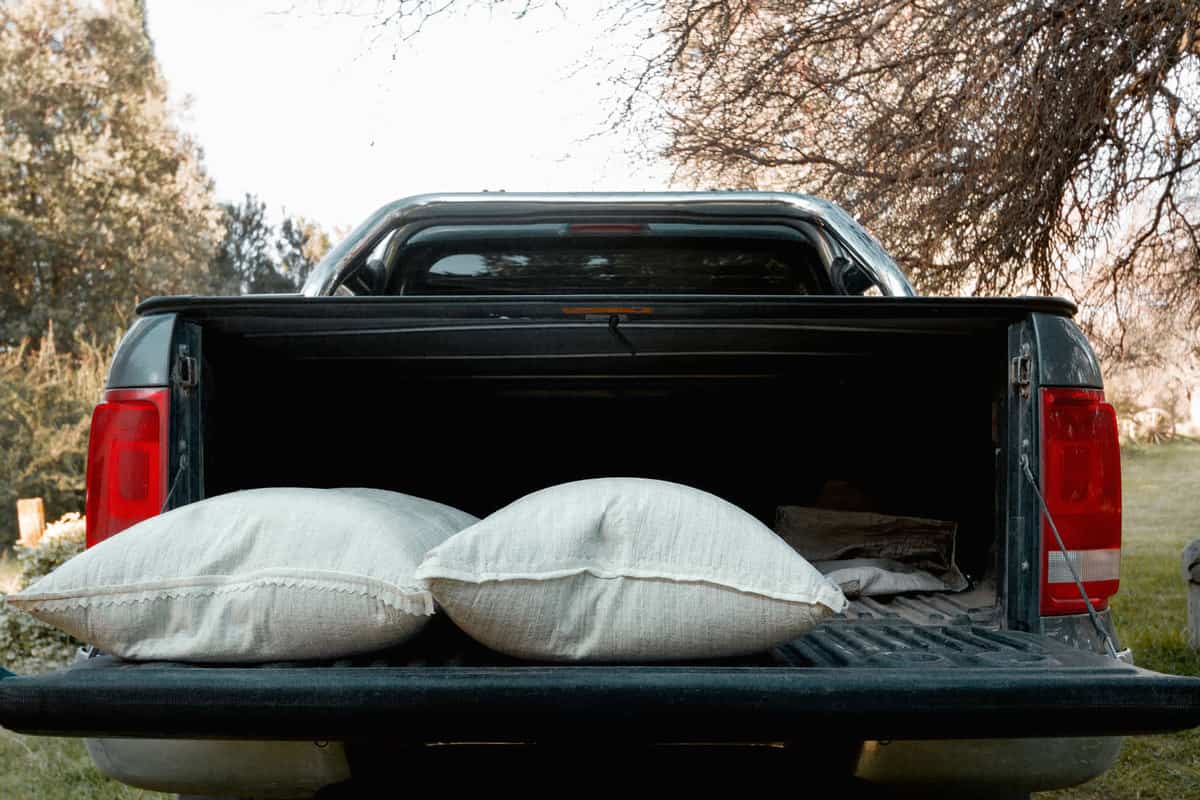Would you like to know how much a truck bed typically weighs? Well, we have researched these questions and have some answers for you. It can be essential to know how much your truck bed weighs when calculating how much weight your truck can hold.
A truck bed typically weighs between 150 and 600 pounds. The exact weight of your truck bed will depend on its size and material.
In this article, we will learn how much a truck bed typically weighs. We will also cover other interesting related questions like how to weigh your truck bed and what happens if you put too much weight in your truck bed. Keep reading to learn more.

How Much Does A Truck Bed Typically Weigh?
When it comes to how much you can expect a truck bed to weigh typically, many factors will go into it. One of the biggest things that will affect a truck bed's weight is its size. A larger truck bed will weigh more.
Another thing that will significantly affect the weight of a truck bed is the material. Some truck beds are made out of lighter materials to decrease the weight of the truck bed.
Other truck beds are made for sturdier material than the standard truck bed to increase durability. Opting for a sturdier truck bed will come at the cost of increased weight.
Let's look into these differences in truck beds and see how they affect the weight of a truck bed.
Truck Bed Size
While other factors will affect the weight of a truck bed, the size of the truck bed is one of the most critical.
Truck beds typically come in three different sizes. These sizes are short truck bed, standard truck bed, and long truck bed. We will now look at how much each of these affects the weight of a truck bed.
Short Truck Bed
If your truck comes with a short truck bed, you can expect the truck bed to be about 5 feet long. The short truck bed 0ffers increased handling at a decrease in carrying volume.
A short truck bed made from standard materials will weigh around 150 to 200 pounds. This will vary depending on the exact brand you select. While the shorter truck bed may hold less volume than a larger truck bed, its decreased weight will allow you to carry a heavier load with your truck.
Standard Truck Bed
The standard truck bed is just that, the standard-sized truck bed for most trucks. If your truck has a truck bed like this, you can expect it to be about 6 feet long.
When you have a standard-sized truck bed, you will find that your truck bed weighs between 150 and 200 pounds. The standard-sized truck bed is the optimum truck bed for most situations by balancing volume capacity and weight capacity.
Long Truck Bed
The long truck bed was made for people who want a larger-looking truck and need to move large amounts of material. The average long truck bed is about 8 feet long.
While the long truck bed can hold more material than a standard or short truck bed, it does weigh significantly more. The average long truck bed weighs between 400 and 600 pounds. This increase in weight does reduce the amount of weight you can carry in exchange for increased carry volume.
Even though a long truck bed reduces how much you can carry, the carrying capacity of a long truck bed isn't the main reason people choose a long truck bed. The main appeal of owning a long truck bed is how it increases the size of your truck. Many people who are fans of long truck beds are because they enjoy driving a large-looking truck.
Truck Bed Material
Another factor that can significantly affect the weight of a truck bed is the material that it is made out of. There are three primary truck bed materials that companies tend to make their truck beds out of. We will now look at how each of these different truck bed materials can affect the weight of a truck bed.
Aluminum Truck Bed
One of the most popular upgrades to a truck bed is to opt for an aluminum truck bed. An aluminum truck bed is almost as strong as a steel truck bed, with the added benefit of weighing less.
An aluminum truck bed will weigh as much as 100 pounds less than a steel truck bed of the same size. This weight reduction can significantly increase the carrying capacity of your truck.
There is one other benefit to using aluminum over steel for a truck bed. Aluminum is far more flexible than steel. This increased flexibility means that when you load heavy items into your truck bed, the truck bed will bend and recover instead of denting. An aluminum truck bed after a few years will have many fewer dents than its steel counterpart.
Steel Truck Bed
Steel truck beds are the go-to choice for most trucks. Steel is chosen as the standard for truck bed materials because of its incredible strength.
While steel may not be as flexible or light as aluminum, it is technically stronger. A truck bed made out of steel will be a long-lasting a reliable truck bed.
Utility Truck Bed
The third type of truck bed is a utility truck bed. While a utility truck bed isn't a different material than the steel truck bed, it is different. The utility truck bed was built thicker than a standard steel truck bed to be more durable and hold heavier loads. It also has compartments for storing work tools or other cargo.
You can expect a utility truck bed to increase the weight of your truck quite a bit. A utility truck bed can add over 600 pounds to your truck. That 600 pounds are on top of the 150 to 600 pounds that your truck bed may already weigh. This means that a utility truck bed could weigh over half a ton.
While the colossal weight increase of a utility truck bed may seem like a big drawback, there is a reason many professionals opt for a utility truck bed. The utility truck bed can handle the heaviest loads and bring all the tools you may need. The increased durability makes a utility truck bed an excellent choice for anyone who runs their own business or needs a powerful work truck.
Conclusion
As you can see, many factors affect the weight of a truck bed. If you have a standard-size truck bed made of standard materials, you can expect it to weigh between 150 and 200 pounds. When you consider the many different sizes and materials that a truck bed can be made out of, you find that a truck bed can weigh between 150 and 600 pounds.
How Can I Weigh My Truck Bed?
![Cargo bed in Mitsubishi pick-up truck, How Much Bed Liner Does It Take To Paint A Truck? [Plus 3 of the Best Liners]](https://vehq.com/wp-content/uploads/2021/11/Cargo-bed-in-Mitsubishi-pick-up-truck.jpg)
To properly find the weight of a truck bed, there are several methods you could try.
A Force Gauge
The first method for finding the weight of a truck bed is the easiest and safest but requires the most tools. It would be best if you made sure that the truck bed was entirely disconnected from your vehicle. Then attach a lift strap fastened with a force gauge designed to handle several hundred pounds.
When you lift the truck bed off of the truck, it will give you the truck bed's weight on the force gauge.
Vehicle Scale
The following method involves a vehicle scale. You will need to weigh your vehicle to start and have some people help you lift and remove the truck bed from your vehicle. After that, you will need to weigh the vehicle again and subtract the difference between the two numbers. This will give you the weight of the truck bed as an answer.
Look It Up
The easiest method to find out how much your truck bed weighs is to look it up. If you still have your stock truck bed, you should be able to look up the brand and model of your truck and find out how much the truck bed weighs. Even for most aftermarket truck beds, you should find the weight of the truck bed listed on the manufactures website.
No matter which method you use, finding the weight of your truck bed can be helpful before you plan to carry a large load.
Is It Bad To Leave Weight In Truck Bed?

When it comes to leaving weight in your truck bed, many people want to know if it is okay for your truck. While leaving weight in your truck bed doesn't pose an immediate threat to your truck, it does pose some issues.
If you leave weight in your truck bed, the weight will keep your suspension springs from fully uncompressing. If left compressed for too long, the springs may not fully uncompress. This will reduce the effectiveness of your suspension. This is the main reason you shouldn't leave weight in your truck bed.
Should I Put Weight In The Back Of My 4x4 Truck?
While adding weight to the back of your truck is a great way to improve traction, a 4x4 truck probably doesn't need it. A 4x4 truck sends power from the engine to all four tires. This dramatically improves the traction of the vehicle.
Many experts agree that a four-wheel-drive truck probably doesn't need any additional weight in the back. Extra weight isn't required because a four-wheel drive is already efficient at sending power to the tires so that it won't help much.
What happens if I put too much weight in my truck bed?

If you put too much weight in your truck bed, it could cause issues with the suspension. When you carry a load, it is designed to bounce a little during your drive. This bouncing keeps stress off of the main body of your vehicle. When you overload your truck bed, the suspension springs are compressed to the point that they cant bounce when you drive.
The suspension springs not functioning properly can cause damage to your vehicle. It may also make it unsafe to carry your load. Always be sure not to overload your truck bed before your drive.
Final Thoughts
This article taught us how much a truck bed typically weighs, given different sizes and materials. We also learned that you don't need to weigh down the back of your truck to improve traction if that truck is a 4x4.
We hope you enjoyed this article. If you would like to learn more, check out some of these other posts.
Truck Bed Dimensions – Length and width by bed type
How To Get A Dent Out Of A Truck – 6 DIY Methods for Truck Body and Bed!
